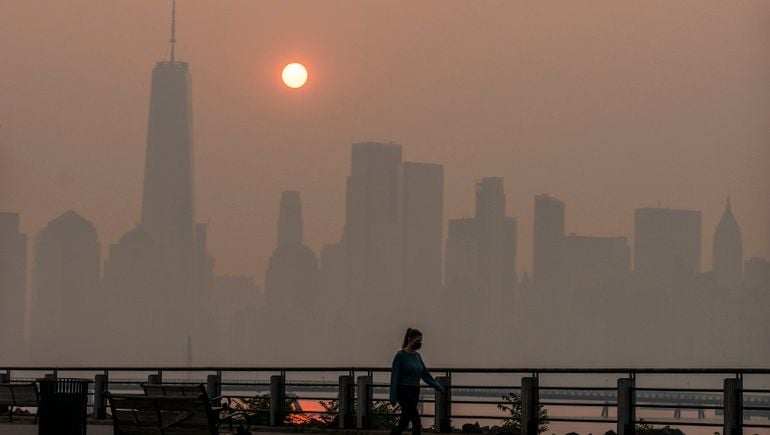A blanket of smoke continues to smother much of the Northeast in the U.S., sparking school shutdowns and work-from-home orders from companies like Google.
Yet while kids stay at home and tech employees boot up their home offices, there remains no mandate in the construction industry with regards to air pollution, said Mike Elmendorf, president and CEO at the Associated General Contractors of New York State. Neither the Environmental Protection Agency nor OSHA have mandates on when outdoor work should cease due to hazardous air quality.
“We have been in communication with the Governor’s Office and, at this point, there are no mandates or new requirements in place impacting construction work outdoors as a result of the current air quality situation,” said Elmendorf. “Like everyone else, we are hopeful that this will be a temporary challenge and that the air quality will improve in the coming days.”
As a result, contractors on Thursday took matters into their own hands. Despite no regional mandate, various individual contractors, like New York City-based builder Charney Companies, gave the day off to workers who wanted it due to the poor air quality.
“We are providing masks to workers and making sure that all know that if they feel tired or need a break, they can rest in the field office or can go home,” said Justin Pelsinger, chief operating officer at Charney Companies. “[On Wednesday], we were down workers, as some left early because of the smoke.”
New York City-based Turner Construction deferred on activities on certain projects most adversely affected by air quality concerns, out of respect for workers, said Kevin Chase, director of lean and environmental health and safety at Turner’s New York office. The construction firm also, in collaboration with trade partners, offered N95 masks to the workforce where applicable.
“This was a condition that had little lead time and it was great to see how agile the industry was in responding to this,” said Chase. “We continue to closely monitor the situation today and for as long as this condition presents itself.”
Meanwhile, the poor air quality has moderately impacted Skanska’s projects in New York, New Jersey and Pennsylvania, specifically where operations are being performed outside, said Paul Haining, chief environmental health and safety officer at Skanska. Those impacts have not yet caused any shutdowns or delays, but teams have adjusted operations to support the health of trade partners, said Haining.
“A few of the adjustments include modifying work schedules and activities, incorporating additional rest periods throughout the day and making sure personal protective equipment is readily available,” said Haining. “Our Skanska environmental health and safety counterparts on the West Coast have also played an integral part in sharing their experiences and resources as we navigate our current situation on the East Coast.”
Elmendorf said AGC NYS is also consulting with other AGC chapters on the West Coast, where smoky conditions due to wildfire occur frequently. Elmendorf hopes those conversations can benefit members on the East Coast.
When wildfire smoke engulfed jobsites on the West Coast in 2020, contractors who shut down projects faced a conundrum with owner clients, due to the lack of cover from mandates to protect workers during bad air quality periods.
The New York City Department of Buildings also shared there are no plans to mandate a citywide halt to construction due to the current air quality issues. Currently, individual contractors are not required to let any department or agency know of site closures, according to the DOB.
Brian Turmail, vice president of public affairs and strategic initiatives at AGC, said he has not “heard of any delays or disruptions” from its members yet due to smoky conditions. Carlo Scissura, president and CEO of the New York Building Congress, said their members throughout the region “are monitoring the situation, and individual firms will take necessary precautions.”
For now, contractors going ahead with work can focus on the following tips, said Scott Smith, director of safety management at Branchville, New Jersey-based Selective Insurance.
- Deviate the work schedule to temporarily shift workers to indoor work.
- For indoor work, keep all windows closed and only run air handling systems with mechanical filtering.
- Look to reduce the length of work shifts and to reduce physically demanding work that requires higher breathing rates.
- Educate workers about wildfire smoke hazards and encourage them to speak up if air quality or symptoms worsen.
- Offer NIOSH approved respirators, such as N95 masks.
